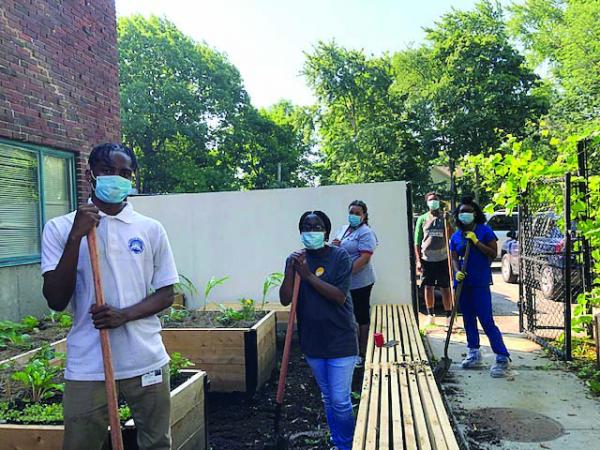August 27, 2020

Back to front: Eric Dawson of Green City Growers, Codman Summer Interns Katia Antunes, Keianna Grant, Joanna Casimir and Pierson White. Photo courtesy Codman Academy
A new “community learning garden” at Codman Square Health Center has sprouted this summer in the shared backyard between the health center and Codman Academy, creating a green, outdoor classroom as well as a space for hands-on learning about agriculture, nutrition, and food justice.
Developed as part of a partnership and collaboration between Codman Academy and Codman Square Health Center that goes back nearly two decades, the new garden is an example of how community health centers and schools can creatively use small outdoor spaces to promote healthy lifestyles and disease prevention.
Chetna Naimi, director of that partnership, was a key visionary behind the community garden project along with Caitlin Dwyer-Huppert, education manager of Green City Growers (GCG) in Somerville. GCG, which has been transforming underutilized spaces in Boston and the region into gardens and biodiverse landscapes for 12 years, provided the skills and techniques to bring the plan to life.
In mid-June, GCG staff installed raised garden beds made of Vermont cedar and a drip irrigation system that waters the garden every 12 hours to ensure high quality crops. The raised beds are 22 inches tall and cover an area of 152 square feet. The garden design features a keyhole shaped garden bed and 24-foot long bed along the pathway through the garden.
The space is designed to maximize growing space and ease of use as an outdoor classroom. Custom-made cedar benches provide inviting, comfortable outdoor seating that can accommodate close to 20 people.
Naimi told the Reporter that the building and maintenance of the garden was also incorporated into the partnership’s summer internship program.
“For the past eight weeks, each Monday morning the interns worked closely with GCG garden instructor and urban farmer, Eric Dawson, to bring life to this community garden,” wrote Naimi. “In summer heat, they filled in the soil in the raised beds, helped spread the mulch, and planted about 18 kinds of vegetables, herbs, and flowers. Crops include, kale, rainbow Swiss Chard, herbs such as basil, lemon balm, and cilantro, and tomatoes, green peas, beans, watermelon, squash, corn, and more.
“The garden work was always followed by a robust discussion on food justice, its imperative connection to health disparities in the underserved communities, and how youth of today must understand the value of eating fresh, locally grown produce,” she added.
“The interns talked about growing healthy foods, connection to the garden and their sense of accomplishment, and how they are already trying new vegetables that they have planted in the garden. As the summer interns engaged and contributed to the learning space, they also developed a sense of community, pride, and responsibility.”
In addition to gaining access to fresh, healthy foods and learning how to plant fruits and vegetables, Codman interns and the health center community at-large will stand to benefit from the intangibles that a garden offers, explained Naimi.
“The social benefits of community gardens are well established and the possibilities are endless and create social capital for bonding, bridging, connecting our staff, students and patients to the environment, neighborhood development, and social aspects of health and resilience. The direct link between community growing space and improved mental and physical health is also well proven for all ages, and just being around a vegetable garden is also linked to increased consumption of fresh fruits and vegetables.”
Naimi expects the new space, developed with grant support from the Kendall Foundation and the USDA-Farm to School program, will become a cornerstone of the internship program and remain a community asset for years to come.
“With support from GCG and the Farm to School grant program, many of these high school seniors will continue to work to maintain, harvest, and share the bounty of the garden. We are confident that the benefits of this outdoor learning space will go far beyond the tangible short-term first crop yield.”



